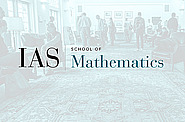Seminars Sorted by Series
Analytic and Geometric Number Theory Seminar
Dec
10
2009
Analytic and Geometric Number Theory Seminar
The Inverse Conjectures for the Gowers Norms
2:00pm|S-101
Dec
16
2009
Analytic and Geometric Number Theory Seminar
The talks will resume during the School of Mathematics Second Term.
2:00pm|S-101
Dec
17
2009
Analytic and Geometric Number Theory Seminar
The talks will resume during the School of Mathematics Second Term.
2:00pm|S-101
Jan
21
2010
Analytic and Geometric Number Theory Seminar
The Positive Density Conjecture for Integral Apollonian Packings
Elena Fuchs
2:00pm|S-101
Jan
28
2010
Analytic and Geometric Number Theory Seminar
Bounds Toward Ramanujan Over a Number Field
Farrell Brumley
2:00pm|S-101
Feb
03
2010
Analytic and Geometric Number Theory Seminar
A Subconvexity Bound for automorphic L-Functions for SL(3,Z)
Liangyi Zhao
2:00pm|S-101
Feb
04
2010
Analytic and Geometric Number Theory Seminar
On the Sup-Norm of Maass Forms of Large Level
2:00pm|S-101
Feb
11
2010
Feb
18
2010
Analytic and Geometric Number Theory Seminar
Integral Points on Quadraics in Three Variables With Almost Prime Coordinates
2:00pm|S-101
Feb
25
2010
Analytic and Geometric Number Theory Seminar
Analytic Methods to Compute Dirichlet L-Functions and Character Sums
2:00pm|S-101
Mar
04
2010
Analytic and Geometric Number Theory Seminar
One Parameter Families of Elliptic Curves with Maximal Galois Representations
A. C. Cojocaru
2:00pm|S-101
Mar
11
2010
Analytic and Geometric Number Theory Seminar
Distribution of extreme values of L-functions in the strip 1/2 < Re(s) < 1
2:00pm|S-101
Mar
18
2010
Analytic and Geometric Number Theory Seminar
No Analytic & Geometric Number Theory Seminar this week, in lieu of the Workshop on Analytic Number Theory
2:00pm
Mar
25
2010
Analytic and Geometric Number Theory Seminar
Metaplectic Ramanujan Conjecture and Ternary Quadratic Forms Over Function Fields
Jacob Tsimerman
2:00pm|S-101
Apr
01
2010
André Joyal’s 70th Birthday
Feb
25
2013
André Joyal’s 70th Birthday
A Type System With Two Kinds of Identity Types
10:00am|West Bldg. Lecture Hall
Feb
25
2013
André Joyal’s 70th Birthday
Connectedness and the Freudenthal Suspension Theorem
11:00am|West Bldg. Lecture Hall
Feb
25
2013
André Joyal’s 70th Birthday
Joyal Theorems for Homotopical Species
Joachim Kock
2:00pm|West Bldg. Lecture Hall
Feb
25
2013
André Joyal’s 70th Birthday
Rings and Near Rings in 2-Monoidal Categories
Marcelo Aguiar
4:00pm|West Bldg. Lecture Hall
Feb
25
2013
André Joyal’s 70th Birthday
Braid Extended Power Operations in Topology
Terry Bisson
5:00pm|West Bldg. Lecture Hall
André Weil -- A Conference on His Work and its Influence
Jan
08
1999
André Weil -- A Conference on His Work and its Influence
A. Weil and Topology
2:45pm|Simonyi Hall 101
Jan
08
1999
André Weil -- A Conference on His Work and its Influence
A. Weil and Algebraic Geometry
4:00pm|Simonyi Hall 101
Jan
09
1999
André Weil -- A Conference on His Work and its Influence
A. Weil and the Building of Adelic Geometry
9:00am|Simonyi Hall 101
Jan
09
1999
André Weil -- A Conference on His Work and its Influence
A. Weil and C. L. Siegel
Robert Langlands
10:45am|Simonyi Hall 101
Jan
09
1999
André Weil -- A Conference on His Work and its Influence
A. Weil and Advanced Analytic Number Theory
12:00pm|Simonyi Hall 101
Arithmetic Combinatorics
Sep
25
2007
Oct
30
2007
Arithmetic Combinatorics
On the Property Testing of Hereditary Graph and Hypergraph Properties
Terrence Tao
2:00pm|S-101
Nov
13
2007
Arithmetic Combinatorics
Product Growth and Mixing in Finite Groups: Variations on a Theme of Gowers
László Babai
2:00pm|S-101
Nov
14
2007
Nov
27
2007
Arithmetic Combinatorics
Inverse Theorems for Large Subsets of sums of Dissociated Sets
2:00pm|West Building Lecture Theatre
Dec
05
2007
Arithmetic Combinatorics
Some Properties of Sum and Product Sets in Finite Fields
2:30pm|West Building Lecture Theatre
Arithmetic Combinatorics Mini-Course
Arithmetic Geometry Seminar
Jun
07
2023
Arithmetic Geometry Seminar
Some Results and Questions on Sen Operators
Lue Pan
4:30pm|Simonyi Hall 101
Jun
09
2023
Arithmetic Geometry Seminar
Arithmetic Minimal Model Program and Applications
4:30pm|Simonyi Hall 101
Jun
12
2023
Arithmetic Geometry Seminar
Stacky Approach to the Non-Abelian Hodge Theory in Char. p>0 (work in progress).
4:30pm|Simonyi Hall 101
Arithmetic Groups
Oct
06
2021
Arithmetic Groups
First order rigidity of high-rank arithmetic groups
11:00am|Simonyi 101 and Remote Access
Oct
13
2021
Arithmetic Groups
First-order rigidity, bi-interpretability, and congruence subgroups
Nir Avni
11:00am|Remote Access
Oct
20
2021
Nov
03
2021
Arithmetic Groups
Non-virtually abelian anisotropic linear groups are not boundedly generated
11:00am|Remote Access
Nov
10
2021
Nov
17
2021
Arithmetic Groups
Algebraicity/holonomicity theorems
Vesselin Dimitrov and Frank Calegari
11:00am|Simonyi 101 and Remote Access
Dec
01
2021
Arithmetic Groups
Applications to modular forms and noncongruence arithmetic groups
Yunqing Tang and Frank Calegari
11:00am|Simonyi 101 and Remote Access
Dec
08
2021

